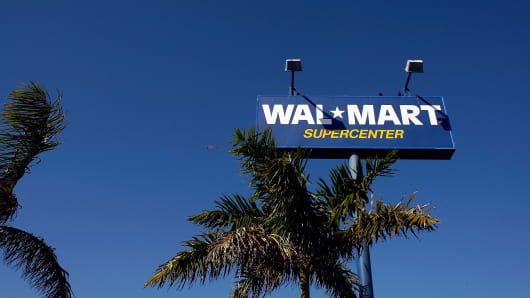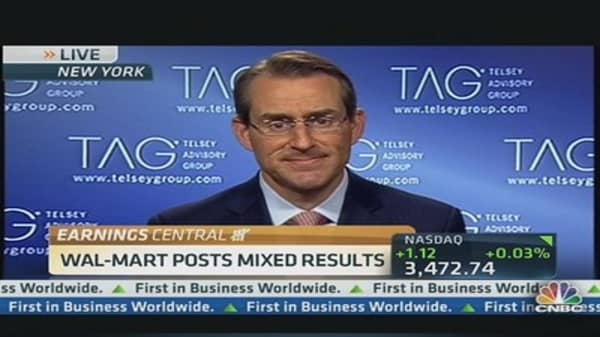Visits to Walmart U.S. stores open at least a year fell 1.8 percent, while the average amount spent per trip rose 0.4 percent.
Sales of warm-weather items, from outdoor furniture and sporting goods to fans and spring clothes, were challenged, particularly from mid-March to mid-April, Simon said. At the same time, price increases in grocery items were lower than expected, "and in fact, we had some deflation in areas like dry grocery," he said on a recorded call.
Weakness during the quarter was not limited to Wal-Mart. Target, for example, said in April that its same-store sales were likely to come in lower than expected because of soft demand for spring merchandise and weather-sensitive items. It reports results next week.
This week, both Macy's and Kohl's said weather had hurt their quarterly sales.
(Read More: Kohl's Earnings Top Forecast, but Weather Hurts Sales)
Consumers have seen some relief as gas prices have retreated, but "there's going to be some choppiness" for retailers as it takes little to spook shoppers, ITG's Tomlinson said.
Holley said Wal-Mart was seeing "very healthy, positive" same-store sales so far in the second quarter at Walmart U.S. and also feels good about sales at its Sam's Club warehouse chain, which caters to clients such as small business owners.
Meanwhile, Sam's Club raised some of its annual membership fees by $5 and $10, bringing them to $45. Sam's Club's highest fee remains at $100, which is $10 below that of rival Costco Wholesale.
Bribery Probe Costs
In 2011, Wal-Mart began a probe into alleged violations of the U.S. Foreign Corrupt Practices Act and whether the company had handled such matters appropriately.
The situation drew public attention in April 2012, when the New York Times reported that management at Wal-Mart de Mexico orchestrated bribes of $24 million to help it grow quickly in the last decade and that the U.S. parent's top brass tried to cover it up.
Wal-Mart spent $73 million on FCPA work in the first quarter, rather than the $40 million to $45 million it had anticipated. It expects to spend another $60 million to $65 million in the second quarter.
(Read More: Wal-Mart's Staffing Levels Criticized Over Not-So-Fresh Groceries)
About $44 million of the first-quarter FCPA costs stemmed from ongoing inquiries and investigations, while the other $29 million was for a global compliance review, program enhancements and organizational changes, Wal-Mart said.
In the first quarter, profit fell in Wal-Mart's international division, with operating costs growing faster than sales. The company said it was spending more in areas such as international e-commerce and is also stepping up compliance efforts across 14 areas from ethical sourcing to licenses and permits.
Wal-Mart is also spending on behind-the-scenes changes such as setting up a shared services group for its Latin American businesses.
Missing Expectations
Wal-Mart earned $3.78 billion, or $1.14 per share, in the first quarter ended on April 30, up from $3.74 billion, or $1.09 per share, a year earlier.
The analysts' average estimate was $1.15 per share. Wal-Mart had forecast a profit of $1.11 to $1.16 per share.
First-quarter revenue rose 1 percent to $114.19 billion. Analysts expected $116.29 billion.
The company said it expected second-quarter same-store sales, excluding those of fuel, to be flat to up 2 percent at Walmart U.S. and up 1 percent to 3 percent at Sam's Club.
Wal-Mart spent about 2 cents per share on e-commerce investments in the first quarter and expects to spend about the same amount in the second quarter as part of its plan for total spending of 9 cents per share for the year.





